Comfort Dogs at the Oakland Warehouse Fire
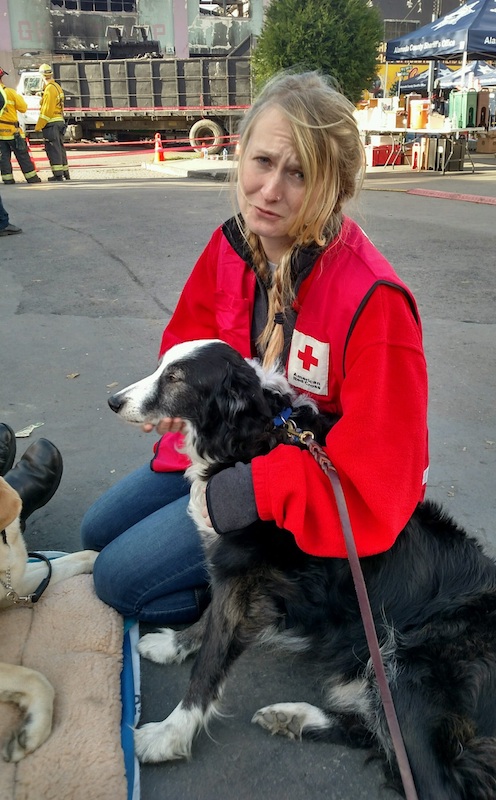
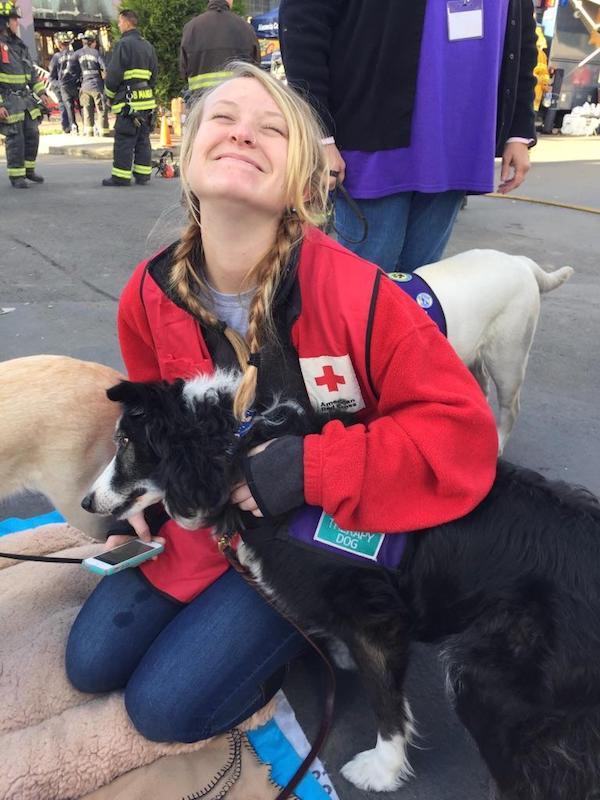
Sweep helps a Red Cross volunteer
Late in the evening of December 2, 2016, the Ghost Ship warehouse in Oakland caught fire and burned intensely. Although there were no residential or event permits for the building, many people lived there and a concert was held that night. Fire fighting, rescue, and recovery efforts were hampered by clutter, crowded conditions, and fears that the building would collapse. Hopes for finding living victims soon faded and 36 bodies were retrieved over the next three days.
The morning after the fire, SLDTC member Debbie Wanlin listened in horror to the news. She wondered if her Lab, Posey, could comfort any of the people at the scene. Posey is experienced in such work and had recently completed her Distinguished Therapy Dog title (which requires a minimum of 400 visits at therapy organizations recognized by the AKC). Debbie called the Valley Humane Society in Pleasanton, which certified Posey for therapy work and sponsors much of her therapy activity. VHS approved the visit. Debbie next called SLDTC trainer Denise Laberee (who certifies dogs for VHS). Denise and her Border Collie, Sweep, often join Debbie and Posey in therapy visits at medical facilities, to provide stress release to students facing finals, and at Paws to Read sessions where the dogs listen with interest but without criticism to beginning readers. Denise and her dogs have experience with disaster work as well.
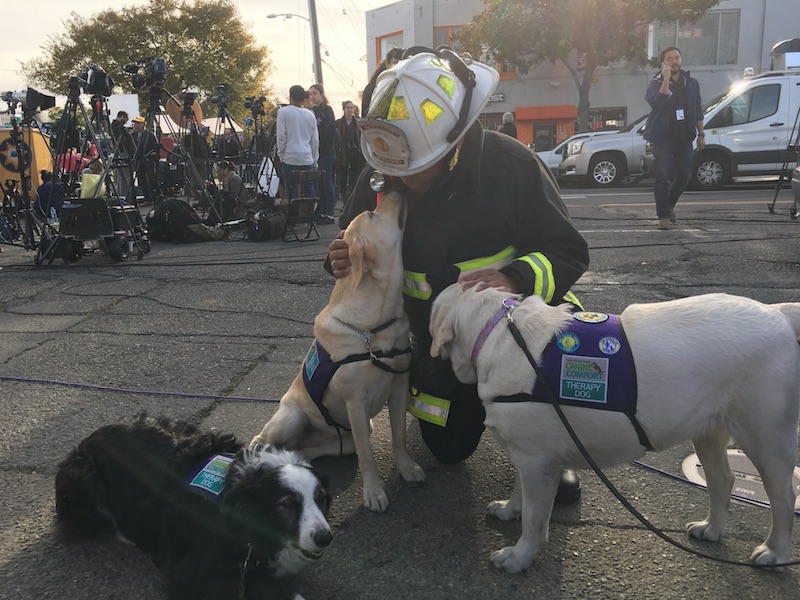
Chaplain Landeza
At the fire site, Debbie and Denise met SLDTC student Constance Barich and her dog, Rosie. Rosie is also a VHS-certified therapy dog. All three dogs wore their VHS therapy vests, permitted only at VHS-approved events. Not sure what to do, the three therapy teams waited outside the police tape with a large gathering of local, national, and international press. Before long, Red Cross volunteer and clinical psychologist Dr. Debra Puryear asked if the dogs were comfort dogs. When the handlers responded in the affirmative, Dr. Puryear led them across the tape so they could get to work.
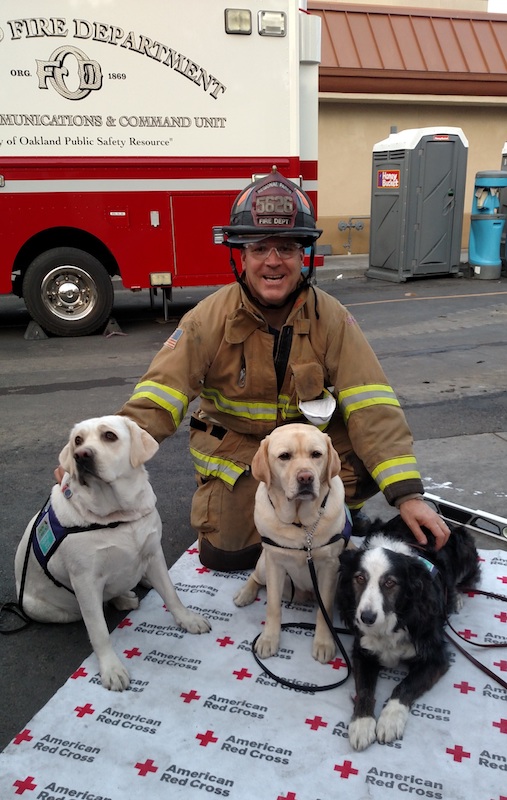
Lt. Tait
Despite the chaos of the situation, first responders (including sheriffs, police officers, firemen, EMTs, ATF agents, Office of Emergency Communications staff, and American Red Cross volunteers) were well coordinated. Everyone knew his or her job. The Red Cross provided food and blankets; many people thought the dogs were from the Red Cross.
Neighboring businesses did what they could to help. The local Wendy's parking lot was taken over by workers, emergency equipment, and supplies. While it could not do business during the crisis, the restaurant stayed open so that first responders could come in for warmth, to use the restrooms, and to have coffee and chili. Domino's Pizza and Starbucks also donated food. The Red Cross provided hot food as well, but the local contributions were invaluable for the first two days before the Red Cross tents and supplies arrived.
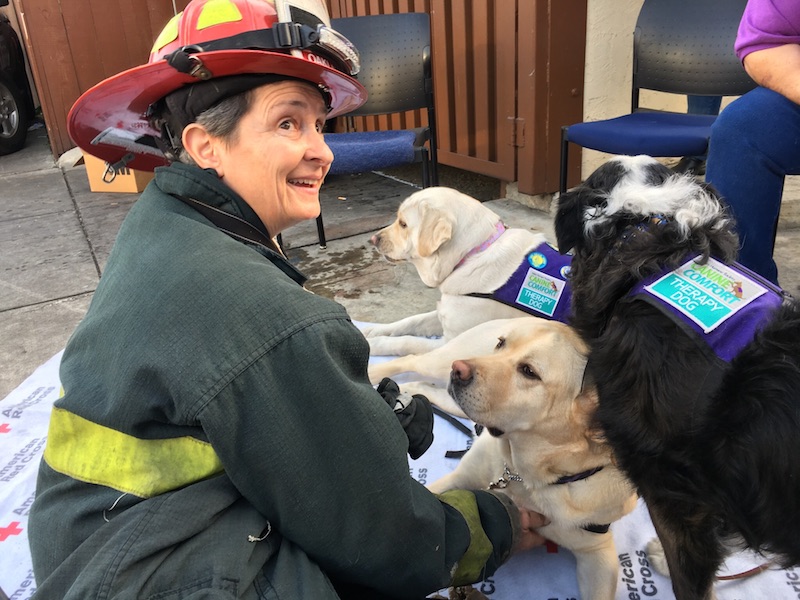
Fire Inspector Maria Sabatini
On the first day, the dogs primarily worked with first responders. The handlers stood back and let the dogs help where they were needed. Posey and Sweep had the same demeanor. They didn't jump on anyone, didn't knock anyone over. Without pushing, they waited for people to approach them. Debbie remarked, "It is as simple and as complicated as dogs provide unconditional love and comfort and that is what is needed." Denise added, "At first people pet the dog, then they squat next to the dog and pet the dog, then they laugh while petting the dog." Debbie followed with, "You saw them destress so they could go back to their jobs."
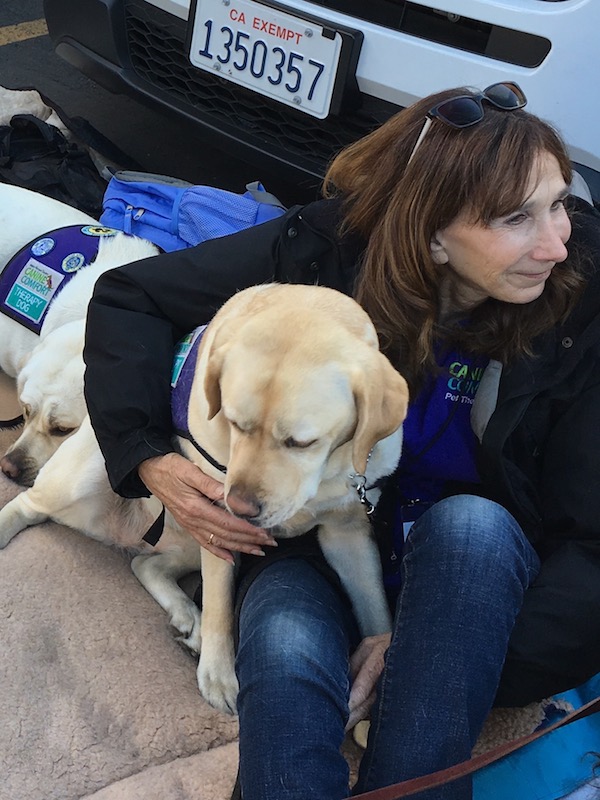
Rosie, Posie, and Debbie
For much of that day, the press waited in the hope of interviewing first responders. They saw the dogs and wanted pictures and sound bites. Debbie and Denise spoke with several reporters, including news crews from Russia and Romania. Coverage of the fire by several local TV stations showed footage of the dogs. KGO broadcast interviews with both Debbie and Denise. Denise said, "They seem to know who needs comfort and who doesn't and they'll just walk up to someone and just lean against 'em if that's what the people need. And they don't even know they need it a lot of the times which is why the dogs are so valuable." In turn, Debbie said, "The dogs are amazing how perceptive they are. They go up to the people that are most in need."
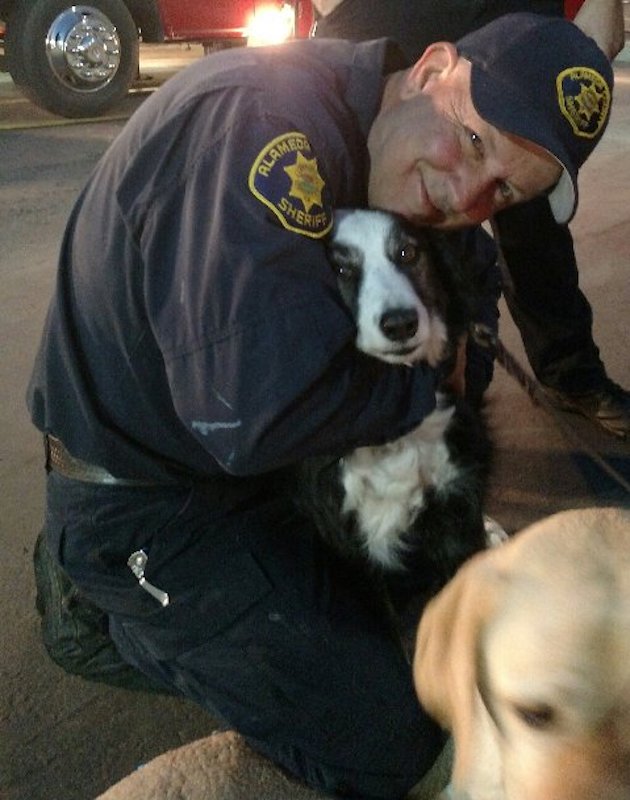
From the Alameda County Sheriff's Office
At the end of one long day, Denise was walking toward Father Jayson Landeza, volunteer chaplain for the Oakland Fire and Police Departments, when she was cornered by a reporter. As they talked, Denise noticed Chaplain Landeza start to leave. As she rushed toward him, the reporter called out. The chaplain glanced at the reporter, waved, and kept on going. At Denise's suggestion, the reporter called out that the dogs wanted to talk to him. Chaplain Landeza immediately came over and Denise asked him if they should bring the dogs back the next day. The chaplain replied that the dogs provided an invaluable service and the teams should come back whenever they wanted. He then left without having the time to talk to the reporter.
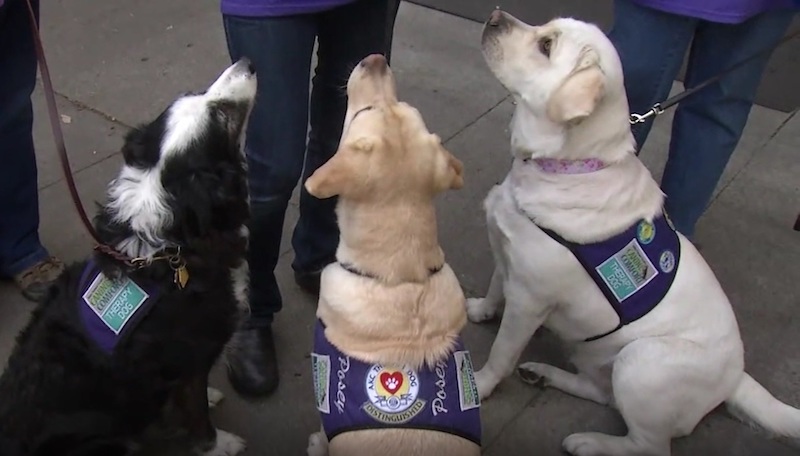
Sweep, Posey, and Rosie
Courtesy of ABC7 NEWS—Copyright ©2016—KGO-TV Inc.
As out-of-town family members were able to travel to Oakland, the dogs had more interaction with friends and family. Sweep kept getting closer and closer to a woman who was waiting for news of her son. And then she was petting him and talking about her son and probably never even realized she was petting the dog. Another woman was holding a newborn infant with tears running down her face. Posey went over and just leaned on her.
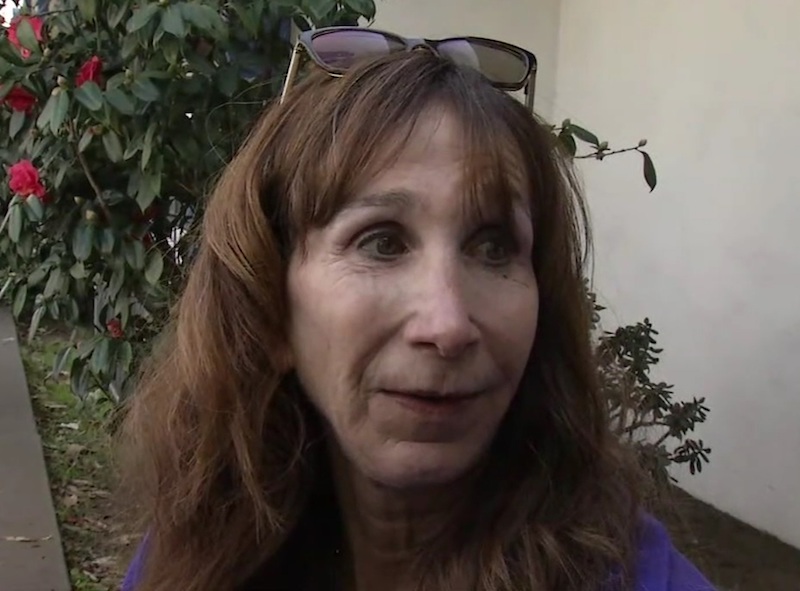
Debbie
Courtesy of ABC7 NEWS—Copyright ©2016—KGO-TV Inc.
After three days, the handlers felt it was time to return to their regular lives. As they said goodbye, the fire chief asked if the dogs could come to all their fires. At their next visit to a high school for finals stress relief, Sweep was very quiet and subdued. Denise had to tell him it was OK to be more active and that they were not visiting another tragedy.
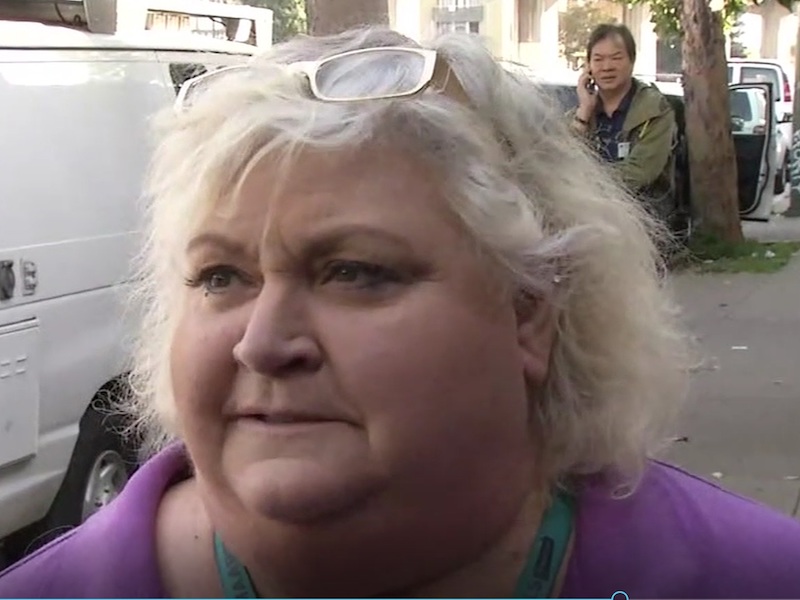
Denise
Courtesy of ABC7 NEWS—Copyright ©2016—KGO-TV Inc.
The emotional toll of the fire on first responders was
summarized in an interview on KTVU with fire department Lt. Mark Tait almost six weeks afterwards. Lt. Tait spoke of the grief and horror as each body was found, how first responders are reminded of the fire over and over, and how they cope with what they saw. He was at the fire site for three days without going home. In those three days, he only smiled once, and that was when petting the dogs. The televised report of the interview included footage of the dogs.
Debbie concluded a discussion of the therapy work at the fire with, "Looking back, I'm so glad we did this and thankful we have dogs who can do it."

 Sweep helps a Red Cross volunteer
Sweep helps a Red Cross volunteer
 Chaplain Landeza
Chaplain Landeza
 Lt. Tait
Lt. Tait
 Fire Inspector Maria Sabatini
Fire Inspector Maria Sabatini
 Rosie, Posie, and Debbie
Rosie, Posie, and Debbie
 From the Alameda County Sheriff's Office
From the Alameda County Sheriff's Office
 Sweep, Posey, and Rosie
Sweep, Posey, and Rosie Debbie
Debbie Denise
Denise